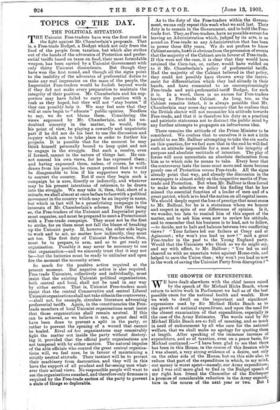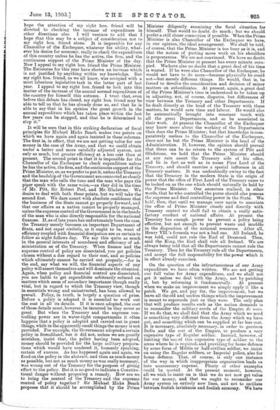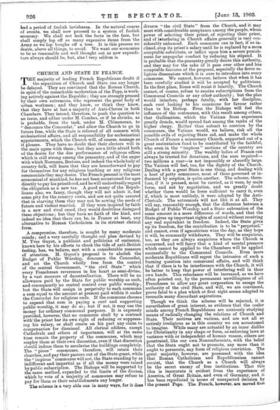THE GROWTH OF EXPENDITURE.
WE have dealt elsewhere with the chief issues raised by the speech of Sir Michael Hicks Beach, whose return to active work in Parliament we hail as of the best possible omen for the national health and wealth. Here we wish to dwell on the important and significant expressions used by Sir Michael Hicks Beach as to the growth of national expenditure, and upon the need for the closest examination of that expenditure, especially in the case of the Army Estimates. The words used by Sir Michael Hicks Beach are so full of meaning, and so much in need of endorsement by all who care for the national welfare, that we shall make no apology for quoting them at length. After speaking of the immense increase of expenditure, and so of taxation, even on a peace basis, Sir Michael continued :—" I have been glad to see that there has been in this House, in the course of this Session while I was absent, a very strong evidence of a desire, not only on the other side of the House, but on this side also, to reduce that part of the expenditure in which,.to my mind, our money is worst spent--namely, our Army expenditure; and I was still more glad to find in the Budget speech of my right hon. friend the Chancellor of the Exchequer a promise of considerable reduction in the Army expendi- ture is the course of the next year or two. But I hope the attention of my right hon. friend will be directed to checking the increase of expenditure in other directions also. I will venture to add that I hope that this may be a subject of consideration not to my right hon. friend alone. It is impossible for any Chancellor of the Exchequer, whatever his ability, what- ever his desire for economy, really to check the expenditure of this country unless he has the active, the firm, and the continuous support of the Prime Minister of the day. Now I appeal to my right hon. friend the Prime Minister. The Estimates for this year have shown an increase which is not justified by anything within my knowledge. But my right hon. friend, as we all know, was occupied with a most laborious legislative task in the latter part of last year. I appeal to my right hon. friend to look into this matter of the increase of the annual normal expenditure of the country for himself this autumn. I trust that, even before this debate has closed, my right hon. friend may be able to tell us that he has already done so, and that he is able to say that in his opinion the great growth in the annual expenditure which has taken place within the last few years can be stopped, and that he is determined to stop it."
It will be seen that in this striking declaration of fiscal principles Sir Michael Hicks Beach makes two points on which we have again and again insisted in these columns. The first is, in effect, that we are not getting value for our money in the case of the Army, and that we could obtain under a better and more carefully adjusted system, not only as much, but greater efficiency at a less cost than at present. The second point is that it is impossible for the Chancellor of the Exchequer to check expenditure unless he has the active, the firm, and the continuous support of the Prime Minister, or, as we prefer to put it, unless the Treasury and the headship of the Government are connected so closely that the man who calls the tune and the man who pays the piper speak with the same voice,—as they did in the time of Mr. Pitt, Sir Robert Peel, and Mr. Gladstone. We desire to deal with both these points, but we will take the second first. We dare assert with absolute confidence that the business of the State cannot go properly forward, and that our affairs as a nation cannot be properly managed, unless the supreme control of the Government is in the hands of the man who is also directly responsible for the national finances. If, as of late years has unfortunately been the case, the Treasury merely becomes an important bepartment of State, and not oxput civitatis, as it ought to be, want of efficiency coupled with financial dissipation are as certain to follow as night follows day. We say this quite as much in the general interests of soundness and efficiency of ad- ministration as of the Treasury. When finance and the supreme control of policy are dissociated, you get policies chosen without a due regard to their cost, and so policies which ultimately cannot be carried out properly,—for in the end, say what we will, the financial aspects of any policy will assert themselves and will dominate the situation. Again, when policy and financial control are dissociated, you are liable to get expendittfre arbitrarily reduced on matters which seem of secondary importance though really vital, but in regard. to which the Treasury view, though in essentials wrong and uninstructed, has been allowed to prevail. Policy, in truth, is largely a question of price. Before a policy is adopted it is essential to work out the cost in all its details. If it is once adopted, the cost of those details must, however, be incurred be they never so great. But when the Treasury and the supreme con- trolling power are in water-tight compartments it often happens that a policy is adopted and carried out in great things, while in the apparently small things the money is not provided. For example, the Government adopted a certain policy in Somaliland, but it did not, unless we are greatly mistaken, insist that, the policy having been adopted, money should be provided for the large military prepara- tions which would have rendered it, humanly speaking, certain of success. As has happened again and again, we fixed on the policy in the abstract, and then as much money as possible, but not as much money as was really necessary, was wrung out of the Treasury for the purpose of giving effect to the policy. But it is no good to indicate a Constitu- tional danger without proposing a remedy. How are we to bring the control of the Treasury and the supreme control of policy together ? Sir Michael Hicks Beach proposes that it should be accomplished by the Prime Minister diligently examining the fiscal situation for himself. That would no doubt do much ; but we should prefer a still closer connection if possible. When the Prime Minister is also Chancellor of the Exchequer we have, in our opinion, the ideal arrangement. We shall be told, of course, that the Prime Minister is too busy as it is, and that the notion of putting more work on his shoulders is preposterous. We are not convinced. We have no doubt that the Prime Minister at present has every minute occu- pied. We have also no doubt that a great deal of his time is wasted. If lie were also Chancellor of the Exchequer, he would not have to do more—because physically he could not—but merely different things. He would, that is, be forced to devolve the consideration and decision of minor matters on subordinates. At present, again, a great deal of the Prime Minister's time is understood to be taken up in adjusting, not, of course, disputes, but differences of view between the Treasury and other Departments. If he dealt directly as the head of the Treasury with these matters, he would save time and labour. He would also be automatically brought into constant touch with all the great Departments, and so be associated in their work. At present the Chancellor of the Exchequer may know more about the working of the Departments than does the Prime Minister; but that knowledge is com- paratively useless to the Chancellor of the Exchequer, since not he but the Prime Minister is the head of the Administration. If, however, the opinion should prevail that there can be no return to the system of Pitt and Gladstone, we hold that the Prime Minister should at any rate assert the Treasury side of his office, and be in fact as well as in name First Lord of the Treasury, and should exercise a special influence in all Treasury matters. It was undoubtedly owing to the fact that the Treasury in the modern State is the origin of power that the office of First Lord of the Treasury came to be looked on as the one which should naturally be held by the Prime Minister. Our ancestors realised, in other words, that he who controlled the purse should also possess the supreme and final controlling power in the State. We lick!, then, that until we manage once again to associate the office of Prime Minister closely and directly with Treasury control we shall fail to obtain a really satis- factory conduct of national affairs. At present the Treasury has enough power to prevent a policy being effective, but not enough to prevent waste and muddle in the disposition of the national resources. After all, Henry VII.'s formula was not a bad one. All Ireland, he was told, could not rule the Earl of Desmond. Then, said the King, the Earl shall rule all Ireland. We are always being told that all the Departments cannot rule the Treasury. Then let the Treasury rule all the Departments, and accept the full responsibility for the power which it in effect already exercises.
On the question of the infructuousness of our Army expenditure we have often written. We are not getting our full value for Army expenditure, and we shall not get it unless we deal with the Army, not by patching it, but by reforming it fundamentally. At present when we make an improvement we simply apply it like a patch. We get, and pay for, the improvement, but we leave all the old and useless things which the improvement is meant to supersede just as they were. The only plan that will produce results such as the nation demands is to reconsider the military needs of the Empire de 'novo. If we do that, we shall find that the Army which we need is something very different from the Army which w@ have got, and something which can be supplied at far less cost. It is necessary, absolutely necessary, in order to garrison India and the rest of the Empire, to produce a very expensive type of Regular soldier. Instead, howeier, of limiting the use of this expensive type of soldier to the areas where he is required, and providing for home defence by some form of Militia or half-civilian soldier, we insist on using the Regular soldiers, or Imperial police, also for home defence. That, of course, is only one instance of the way in which inappropriate organisation-leads us into unnecessary expense. Plenty of other examples could be quoted. At the present moment, however, all we wish to insist on is that we do not now get value for our money, and that we ought to reconsider our Army system on entirely new lines, and not to oscillate between foolish lavishness and foolish economy. We have had a period of foolish lavishness. In the natural course of events, we shall now proceed to a system of foolish economy. We shall not look the facts in the face, but shall simply lop off so many expensive items from 'the Army as we lop boughs off a. tree. It is this process we desire, above all things, to avoid. We want our economies to be as reasonable and well thought out as new expendi- ture always should be, but, alas ! very seldom is.












































 Previous page
Previous page